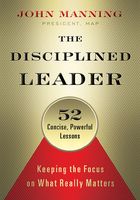

Zero in on Your Values
It’s not uncommon for me to ask people what their values are and then get delayed responses or blank stares in return. Most people understand they have values, but they just can’t articulate them easily. Why? Unless they’ve been prompted in some professional training exercise, their values are likely to be floating around in their head. They just never took the time to define them by asking which values were most important. If they never really had a clear definition of what a value is, then they struggle with clarifying what their values are.
Yet everyone has values—including you. Values tend to be reflected in your behaviors. For example, when you attend a funeral and a eulogy is given to describe the deceased as a good husband, wife, or friend who went out of the way to help others, this is actually a reflection of that person’s values. This example demonstrates how people lived their lives according to values.
Problems surface when leaders overlook the importance of recognizing and aligning their values in key decision making. In fact, one of MAP’s most seasoned consultants estimates that 70 percent of newly hired CEOs are not successful in a new position because their values and, specifically, how they’re leading and managing according to their values, don’t align with the values of the company that hired them.
This issue cropped up with a highly technical company. The company provided specialized services to governments yet upheld values that reflected a somewhat relaxed, open, and forgiving environment. When the company hired a candidate with a military background as its new CEO, this individual was acutely focused on driving results but ran his vendors and staff in an overly regimented, authoritative way. It quickly became clear that, despite certain strengths, this CEO’s values didn’t align with the company’s values. He ended up being a total mismatch for that culture and was let go about a year after being hired.
Values are a big part of your unique identity and leadership. These guideposts shape your decisions and actions, playing a major role in defining who you are and what you do. Values are important for greater self-understanding, which, as mentioned in our previous lesson, is part of the groundwork for becoming a Disciplined Leader.
They can also provide insight into what’s best for you personally and professionally. For instance, your values can serve as a tool for making career choices, everything from whether you accept a job or promotion to how you decide to handle work conflicts.
Disciplined Leaders regularly reference their values in critical decision making and rely on them when they are stuck between “a rock and a hard place.” They use them to establish specific direction and get confirmation about those choices they’ve made. Over time, the practice of consistently aligning values to decision making, particularly as they relate to certain behaviors and actions, builds leadership credibility and respect. If you understand and commit yourself to your values, you can increase your chances of achieving your most important goals in life—and your people will notice!
Whether you’re determining your values for the first time or revisiting them for a status check, the following process can provide the clarity you need:
Start with a master list of values. You’ve got a general sense of what’s important to you, so make a master list of those values, not worrying so much about how many you have. Below are some examples of values to help get your wheels turning.

Figure 2 Sample Values Chart
Identify your core values. Now that you’ve identified the values that resonate the most for you, it’s time to whittle them down to just a few core ones—which is often a little harder for people to do. For the purpose of this exercise, define your core values as your “Top Five.” One of the best ways to determine those five is to ask some value-based discovery questions. For example, what’s most important to you and what do you want to be known for? When were you the most successful in life—and why? What need or wish was met? How were you fulfilled? If you find it extremely important to uphold your integrity at work or with any other aspect of your life, then perhaps integrity is one of your core values.
Let your values guide you. Now that you’ve identified your core values, you have guiding principles to make solid decisions and pursue meaningful direction in both your personal life and work. When you align your behaviors to your values, you will feel happier and more satisfied. You will have your most important priorities in order as you make choices, change, and grow. After you’ve documented your core values, consider sharing them with people you trust to see if they agree with your list. From these discussions, you might find you need to make changes to your list.
In Summary: The Disciplined Leader holds certain values supreme and knows those values nurture and shape personal leadership and an orderly life. Values are the navigational tools for making the right choices and sound decisions. When your behaviors align with your values, you will be more fulfilled, perhaps even happier.
Take Action!
 Go through the process of identifying your core values and then write them down.
Go through the process of identifying your core values and then write them down.
 Assess how your current behaviors and actions align with your core values. Develop corrective actions if you’re in misalignment with your core values.
Assess how your current behaviors and actions align with your core values. Develop corrective actions if you’re in misalignment with your core values.
 Use your core values to proactively and consistently help you make decisions.
Use your core values to proactively and consistently help you make decisions.